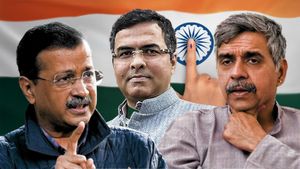The 2025 Delhi Assembly elections are shaping up to be one of the most consequential political contests in recent years, spotlighting the clash between long-time rivals and the shifting dynamics within local politics. Among the most closely watched battles is the one for the Kalkaji constituency, where Bharatiya Janata Party (BJP) veteran Ramesh Bidhuri faces formidable opposition from Aam Aadmi Party (AAP) leader and current Chief Minister Atishi, along with Congress's Alka Lamba.
Ramesh Bidhuri is no stranger to the political scene. Born on July 18, 1961, he came up through the ranks of student politics at Delhi University, where he studied at Shaheed Bhagat Singh College. His political engagement began early, leading to various significant roles within the BJP, including serving as the district president and vice president of the Delhi BJP. Having represented Tughlakabad and South Delhi constituencies at different times, his career has spanned over two decades, including leadership positions such as chairing the Standing Committee on Petroleum and Natural Gas.
Among the intertwining themes of this election is the focus on key issues affecting the Kalkaji constituency, characterized by both affluent areas like Maharani Bagh and densely populated neighborhoods such as Govindpuri. Voters are particularly concerned about problems such as waterlogging, poor road infrastructure, air pollution, and sanitation issues, all overshadowing the campaigning of the respective candidates. Current trends suggest Bidhuri is maintaining leadership over Atishi, which is notable as the BJP has not won the Kalkaji seat since 1993.
Bidhuri’s campaign has emphasized infrastructural improvements and basic amenities, arguing these aspects have suffered under the AAP regime. His history of connections and awareness of local issues play to his advantage, enhancing his appeal to constituents who may feel overlooked by the current administration.
Meanwhile, the broader political climate surrounding the 2025 elections is tumultuous, especially among the INDIA bloc—a coalition of opposition parties. Notably, AAP and Congress, who previously joined forces during the 2024 Lok Sabha elections, are competing against each other. The rivalry has infuriated some bloc members, as indicated by comments from Jammu and Kashmir Chief Minister Omar Abdullah. Abdullah criticized the fierce campaign, remarking sarcastically, "Aur lado aapas mein (fight more)," which reflects his discontent with the divisions within the coalition.
During the Lok Sabha elections, AAP and Congress presented themselves as allies, but the narrative has shifted dramatically, with Rahul Gandhi leading the charge against AAP during the assembly race. Corruption allegations against Chief Minister Kejriwal have become central to Congress’s campaign strategy, as they attempt to regain their political footing through aggressive opposition.
Interestingly, the campaigning dynamics also expose fractures within the supporting factions of the INDIA bloc. While some leaders, like Akhilesh Yadav of the Samajwadi Party, openly backed AAP, others maintained distance, leading to concerns about long-term unity. Abdullah emphasized the importance of collective strategy moving forward. "I have said this before, and I will say it again—someday, the INDIA alliance will have to sit down and discuss our strategy moving forward," he stated. He cautioned against continued fragmentation, urging the need for unity to challenge the BJP effectively.
Despite the tensions and the fierce political rivalry, the overarching reality is clear: the BJP appears poised for a comeback. For the first time in 27 years, the party seems ready to reclaim its foothold in Delhi if trends hold throughout the election process. Politically astute observers are now weighing the potential ramifications of this election not just for local governance but for the national opposition strategy as well.
The stakes are undeniably high for all candidates involved. With the elections scheduled to conclude soon, all eyes remain fixed on the outcome, particularly the potential resurgence of the BJP, which could alter the political composition of Delhi forever.



